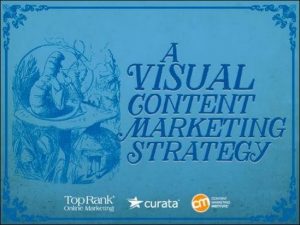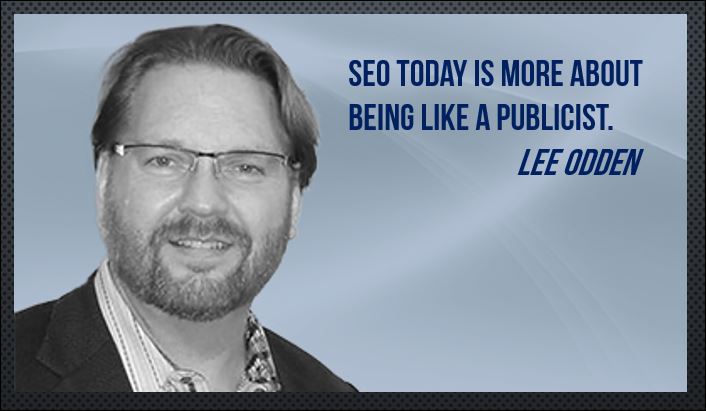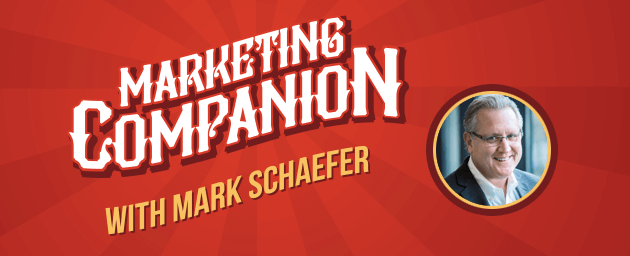I’m working on an exciting new book project and as part of my research, I had the opportunity to interview Lee Odden, CEO of TopRank Marketing and the author of Optimize, one of my favorite business books of the past five years.
Lee is the go-to-guy for digital marketing trends. He’s not only a thought leader, he’s an intense student of the best practices in our field. In this interview, he discloses powerful and practical insights to help guide your marketing strategy today.
Mark: In your book Optimize you stated that, “Content is not just King, it’s the Kingdom.” Is your thinking evolving on that or is that statement still true to the same extent today?
Lee Odden: Solving marketing problems in terms of the attraction, engagement and conversion is all still very centered around content and strategic content creation.
Search doesn’t exist without content. There’s not much sharing going on without content on the social web. I think the distinction today is that it is not about quantity, like maybe it once was. It’s about insight.
A lot of SEO still seems to focus on coming up with really clever ways of creating content, and then more content. They don’t ever mention the word customer, nothing about customer insight, nothing about the customer journey buying cycle and so forth. I think content is the kingdom but in order to function effectively it is not about more, it’s about quality, it’s about experience. It’s about providing the right information at the right time.
What’s the role of customer connection in this? A few years ago social media was small and quiet. You could really tune in and focus on individuals who were high probability customers or sales leads. Today, the noise is growing. The number of people using these tools is growing. Is connection still possible? Can you scale? Is it important to be human or is it really just kind of raw algorithms that make a difference today?
The people working for those SAS companies will tell you the algorithm is your answer, but I think, yes, it’s still possible to scale human connection. It’s harder to do. For many companies, customers are just a name in a database and we’ve tailored specific content based on their specific personas — behavioral, demographic, or whatever. We’re nurturing them along a sales cycle. I don’t think that can be a completely automated process by any means.
I think there’s got to be an inbound marketer who is overseeing marketing automation efforts and lead nurturing because you must have human insight. You have to look for opportunities as they surface in real-time.
I think human connection is more important than ever. Companies are going to have to work harder at being able to earn the attraction of buyers early on in that sales cycle by producing more remarkable and meaningful content.
Storytelling, for example … I know that’s a cliché, but talking as a real person, being more creative, I think that’s where a lot of inspiration for those connections can come into play. I think that’s how companies are differentiating themselves. Definitely.
Even in an automated process, there’s still a human that inserts themselves to create that connection when the opportunity arises?
Absolutely. You know how businesses tend to gravitate toward an automated “one answer” and “the one thing?” I believe you should take a layered approach to customer connection. People are more sophisticated than this single answer approach to things.
In combination with planned content, we’re also going to monitor social media, we’re going to monitor engagement metrics, to see if there are insights that will surface.
The reality is, of course, people aren’t linear in their buying process. They are multi-dimensional and sophisticated. The real-time listening and having a human involved helps you see, “wow, this person just entered our funnel but you know what, they’re ready to buy now!”
You mentioned SEO a few times. What does SEO even mean today in this world of content marketing? It seems a few years ago there was a pretty well-defined set of techniques and practices, you could almost have a checklist. Is this still so defined today?
I do think there are categories of activities that persist, but the checklists, per se, are quite different. I think of SEO as marketing performance optimization relative to search, advertising, email, content, anything you are using to build your business.

Lee Odden
You’re collecting data. You’re collecting key performance indicators as evidence that you’re on or off the right track toward your goal and you use those data-based insights to course correct and optimize the performance of what it is you’re doing.
With SEO, of course, there are still traditional things one can do to help Google do its job because Google is far from perfect! Google has taken a different approach in the last year, and they’ve made some choices that have drastically affected websites that had relied quite heavily on organic search as the source of new business. Those businesses had to make substantial changes, especially when it comes to links and link sources. Many of the link building strategies that have been used have been killed off by Google.
Companies used to pay an SEO to get the most links. Now, they’re paying those SEOs to remove those links.
There are things we can do technically and from a content alignment perspective that make it easier for Google to understand who we are, what we stand for, and whether we are the best choice for the thing that somebody is searching for.
Google is putting more emphasis on the credibility of the author and the originality of the content. Is this something that individuals can work on or do you need more power behind you from an SEO company to help guide you, figuring out how to send these signals to improve my author rank, to improve my site rank and search results?
In the real world, if you move into a new community and into a new job, you want to establish credibility within this new organization. Otherwise, you’ll never get anything done.
To get connected, maybe you would seek out those who already have authority and create some reason to have a relationship. If that results in an endorsement somehow like someone is throwing a party and inviting you, that is going to lead to more credibility and connections for you.
As a metaphor, that’s what Google’s looking for in terms of signals of credibility. I don’t know that Google actually thinks in terms of author or not, but there’s an expression in information retrieval called entities.
A known entity can be human, it can be a company, but it is a thing, like a hub, and it creates content. An entity creates information, and it has others citing it like in professional journals. Theses are the origins of Google and the page rank algorithm.
Rather than page rank being associated specifically to a website, there are signals of credibility that could identify an individual wherever they publish.
If you have a Google+ account, if you have Gmail, if you have a YouTube account, Google can not only factor in the things it normally looks at like links and content, but it can also look at some of that social stream data.
If you write an article on another website like Social Media Examiner, or The Wall Street Journal or something like that, your credibility follows you wherever you go because the citation of you and your name come along with you, if that makes sense.
Mark, what you would do already with your focus on excellent content is a great model for anyone who wants to build up their individual authority. An SEO that is a modern thinking will use tools to uncover opportunities to facilitate the spreading of your story, your content and credibility. SEO today is more like being a publicist. A publicist wants to find out, “What’s the story about Mark? How can we take that story to market to attract visibility and attention?”
That’s very interesting. What you’re saying is that SEO today almost harkens back to traditional public relations. If you get positive exposure on other credible sites it could directly help you move your own content, because it sends a cumulative signal to Google?
Yes. In fact, you hit it right on the head. I’ve always had a high degree of value for public relations, because our agency started as a PR firm 15 years ago. PR, the media relations specifically and the ability to work with publications for that type of visibility is more important than ever for social reach, search and moving your content.
Let’s look at a specific case study. You recently created a series of eBooks based on a vintage “Alice in Wonderland” theme to promote Content Marketing World. It’s awesome stuff. It’s creative. It’s useful. It’s so interesting. That’s step one. Now, how do you actually move the content into networks from there?

The content moves first because we’re creating something cool that people will WANT to see. It is a really good resource for any good marketer, whether they go to the conference or not. So you’re right. Everything starts with the quality of the content.
Once the book went live, we make it easy for people who are involved to share. They’re proud to be part of it. It’s going to move in part because, “Hey, look at this cool thing I’m in.” It actually is cool, not just because somebody is asking you. That’s one dimension of how content moves.
Obviously, we are going to also promote the content. We had an infographic that went along with the eBooks. We had tweetable quotes in this infographic. We had graphical illustrations of great influencer quotes as another piece of quality content that is easy to share. We made Twitter lists of the speakers and profiles of the speakers which will be brought into Pinterest and other things like that deconstruct, if you will, the eBook content. We published interviews with the speakers as additional promotion. The day the book went live, we provided tweets and embed codes for the slide deck to the participants as well as our broader network.
I’ve been publishing lists and all kinds of things like this for many years. Every time I do this I expand the number of people who have influence, and I can go back and say, “Hey, you remember this thing we did. I’ve got another one coming out. If you care to take a look at and share it, great, if you don’t, that’s cool too.”
You’re creating influencer synergy, aren’t you?
Yes. It works and that’s exciting to me, but I’m also really amazed at the people I get to meet and the connections that I get to make along this process.
I want to create a positive, intelligent and creative experience for the people who are involved so they come to know, “That Lee guy, he does this interesting thing.”
You know what, in six months, those connections turn into something. Those connections help me move content through paid channels, organic channels, through networking, through inspiration because we’re all creating this really neat thing together. It’s not just some sort of plastic manufactured thing. It really is kind of cool, organic content. That’s what moves.
Blow this up a little bit more, because you mentioned other content forms like the infographic, which is a cool idea because basically you’re kind of re-purposing the same content to promote the event. What was the SEO angle for promoting the event?
The reason I called the eBook series “Content Marketing Wonderland” is this confluence of the key words. Our target is content marketing and “Wonderland” because it’s a nod to Alice in Wonderland.
The books aren’t going to show up in search for words like “content marketing smarts” or “content marketing secrets,” but when you hear of the eBook whether through earned or paid social media, a lot of people will validate those keywords “Content Marketing Wonderland” by searching on them.
We’re literally creating search demand with projects like this. Believe me, with proper promotion, Content Marketing Wonderland can become a term that is searched on a heck of a lot. Of course, along the way we’re optimizing any assets that could be found from those search terms.
There’s just a lot of stuff going on and multiple channels. It’s supported with email and a little paid amplification, too.
Thanks so much for sharing your insights Lee. Great information for the {grow} community!
This post was written as part of the Dell Insight Partners program, which provides news and analysis about the evolving world of tech. To learn more about tech news and analysis visit TechPageOne. Dell sponsored this article, but the opinions are my own and don’t necessarily represent Dell’s positions or strategies.
Disclosures: Book link is an affiliate link. Lee and I have a business relationship. He has hired me for projects and I have hired him for projects but he has not compensated me to be featured in this post.



